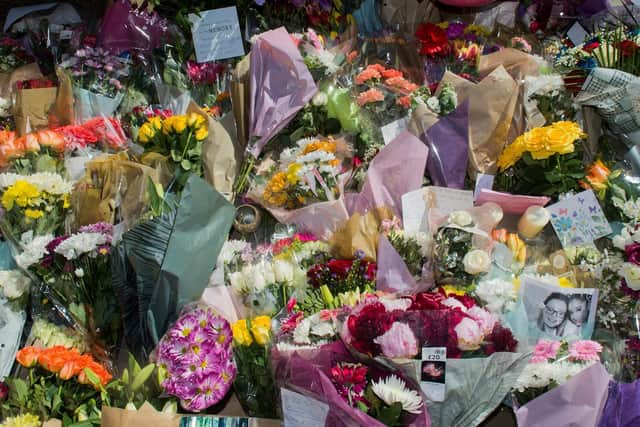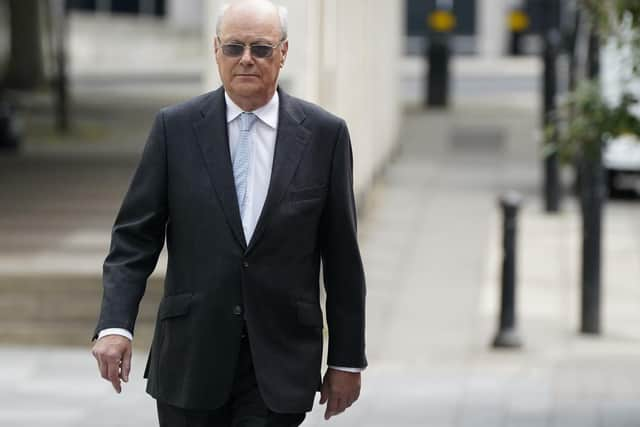"Catalogue of failings" prior to bomb blast at Manchester Arena says solicitor representing family of teenage Leeds victim
and live on Freeview channel 276
Neil Hudgell, of Hudgell's Solicitors, said the failings made the venue an "attractive target" for a terror attack but warned that what is more alarming is that those same failings are still in place four years later.
Twenty-two people died as a result of the bomb detonated by Salman Abedi at the end of an Ariana Grande concert on May 22, 2017.
Advertisement
Hide AdAdvertisement
Hide AdAmong them were Sorrell Leczkowski, aged 14 of Adel; mother of two, Wendy Fawell, aged 50 of Otley and Gateshead teenager Courtney Boyle who was a student at Leeds Beckett University.


The first volume of a report of the public inquiry into the attack on Manchester Arena, which examines security for the venue, has been published today and it, chairman Sir John Saunders, found there were a number of missed opportunities to prevent or minimise the "devastating impact"
.Neil Hudgell, of Hudgells Solicitors, who represents the family of Sorrell Leczkowski as well as fellow victim Philip Tron, said: "This inquiry has strongly demonstrated that there was an inexcusable catalogue of failings at every level which made the venue an attractive target to a terrorist attack, failed to deter or prevent the outrage, and as a result contributed to the loss of life and injury.
"Significantly, at the time, despite the country's national threat level for a terrorist attack being classed as severe, the Government did not have laws in place to enforce venues such as the Manchester Arena and other concert venues to take appropriate counter-terrorism measures in such an environment.
Advertisement
Hide AdAdvertisement
Hide Ad"As a result of these combined failings, thousands of young people who attended the concert on that night were left an open and vulnerable target for terrorists because the security around the venue and event was nowhere near what it needed to be. There were gaps and failings galore.


"If the shortcomings in the UK legal and regulatory framework were not already apparent from earlier attacks in this country, the wave of attacks across Europe including the Charlie Hebdo, Stade de France and Bataclan attacks in 2015 should have left no doubt that existing provisions were inadequate. What is more alarming is that those systemic failings remain in place now, four years on."
The report criticises security arrangement at the venue, with both the Arena's operators, SMG, their security and stewarding sub-contractors, Showsec and British Transport Police (BTP), and employees of all three, responsible for the missed opportunities.
They were that Abedi made a number of "reconnaissance" trips to the City Room before he detonated his shrapnel-packed bomb, he spent 20 minutes there, from 8.50pm to 9.10pm, in a "blind spot" not covered by CCTV before leaving and returning at 9.33pm to take up position.
Advertisement
Hide AdAdvertisement
Hide AdAn adequate patrol of the City Room by Showsec staff shortly before the concert ended, as they were contracted to carry out, was another missed opportunity, but it was Showsec workers' practice not to check the mezzanine area where Abedi hid away from the CCTV. If this had been done Abedi would have been spotted by a patrol.


Sir John concluded the "most striking" missed opportunity involved member of the public, Christopher Wild, reporting Abedi to stewards 15 minutes before the explosion as he waited to picm up his partner's daughter from the concert.
They spotted Abedi and Mr Wild was concerned with his bulging rucksack and worried he might "let a bomb off". He reported Abedi to Mohammed Agha at 10.15pm, but was "fobbed off". A further, connected chance to identify Abedi as suspicious, was missed very shortly after at 10.22pm, just eight minutes before the attack. Mr Agha passed on Mr Wild's concerns to another Showsec steward Kyle Lawler. The men, both then aged 18, eyeballed Abedi, who appeared to notice and looked "fidgety".
Mr Lawler tried to pass the report to the control room but could not get through on his radio. His efforts to raise the alarm were not "adequate" and he instead left the City Room to take up his post for the end of the concert.
Advertisement
Hide AdAdvertisement
Hide AdFinally the report said that if a BTP officer had been in the City Room, then Abedi would have probably been challenged earlier. Despite instructions for at least one officer to be present in the room at the end of the concert, none were present from 10pm onwards.
Sir John said: "No-one knows what Salman Abedi would have done had he been confronted before 10.31pm. The security arrangements for the Manchester Arena should have prevented or minimised the devastating impact of the attack. They failed to do so. There were a number of opportunities which were missed leading to this failure."
The findings are being split into three volumes and a further report will follow on the emergency response and the experience of each of those who died, and finally an analysis of whether the atrocity could have been prevented.